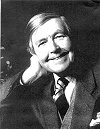 Does
Originality have Value? ... ... ... ... Arthur
Butterworth
Does
Originality have Value? ... ... ... ... Arthur
Butterworth
 Does
Originality have Value? ... ... ... ... Arthur
Butterworth
Does
Originality have Value? ... ... ... ... Arthur
Butterworth
Although often preferring to give the impression that they are quite indifferent to what people say, most creative artists, not least composers, are quite anxious to know what informed critical opinion makes of a new work. Adopting a kind of whistling-in-the-dark attitude, some composers airily dismiss all criticism as being irrelevant; this however, to change the metaphor, is putting one's head in the sand. Critical assessment is an essential part of self-evaluation, a means of looking in the mirror in order to get a more objective view of what one has created.
Perhaps at one stage in musical history the general intention on the part of composers was to go along with accepted canons of musical language that were current at the time: melody, harmony, rhythm, texture and so on. Despite this, there have always been those who sought to do things in a new way, to expand musical language and to seek, whether with determined intent, or merely by some kind of personal, unconscious intuition, an original way of communicating.
Perhaps too, in earlier times, general attitudes tended to be highly critical of deviation from an accepted way of doing things, declaring new things to be unintelligible or even un-playable (for example, the 'Eroica' of Beethoven), the situation in later times seems to have taken the opposite stance: critical assessment more often than not appears almost to demand originality at all costs.
What is the value of originality then ? Without it nothing would change, little or no evolution would come about. Some fields of human endeavour, such as mechanical engineering, medical research or computer technology, for instance, are highly specialised pursuits addressed to informed specialists. However, music is generally not like this; it is essentially a universal language, a means of communication, as much an emotional thing as an intellectual one. Changing the basic symbols of something that appears to be of universal significance: the language of sound and its prime dependence on the immutability of the harmonic series and its intuitive perception by the human ear, would seem to be suspect in some ways. However, this can and has been achieved and the whole art of music has become the richer for it.
One of the tantalising questions about originality in music however, is where each new path might lead. Of course this might be a question that could be asked in any new field of research: whether, for example, the study of the changing feeding habits of some species of birds has any potential significance for humans - or whether it leads nowhere. Some new processes in music, thought to have been totally meaningless and absurd a century ago, have opened up new paths of awareness of the subtleties and meaning of sound.
The pursuit of originality for its own sake, however, is most elusive. The question must surely be to what it is hoped to lead. To escape from a situation which has become too restrictive such as the decline of the earnest style of the high baroque; or the evolution of atonal music at the very end of the nineteenth century.
Some composers have found the conventional means at their disposal not expressive enough for their purpose and have sought new ways; some successful, others leading nowhere.
What seems more important than originality for its own sake though, is the notion of individuality. Originality implies devising a new way of doing something; in music even to the extent of inventing a new language. While a new language can be learned and its meaning understood by those who have the intellectual and emotional perception to follow, this is not easy for everyone. Individuality on the other hand does not mean quite the same thIng: It need not imply a totally new and original - and often perplexing - way of communicating, it more often implies that an a1ready familiar and understood mode of meaning is used with a very personal twist to it: like one's signature4 the individual letters of the name recognisable even though they may not be models of copper-plate precision in their appearance.
Probably more composers could be classed as true individualists than out-and-out original thinkers. It is of course, up to each listener, each critic, to assess for him or herself just which composer and which kind of music might fall into the category of truly original, individual, reactionary, imitation or totally characterless.
Individuality uses a musical language, grammar and syntax that appears logical to accepted practice, its intellectual and emotional message understood. Whereas original thinkers might be regarded as adventurous explorers, individualists might more appropriately be thought of as upholders of a well-established tradition but who comment on it in their own individual way, sometimes as historians, re-affirming and supporting well-established truths.
Originality has certainly proved to be valuable; without it. no progress or evolution would ever have been possible, but it has often turned out to have been arid, and to have lead nowhere worth following.
Individuality has always been more interesting.

Return to index